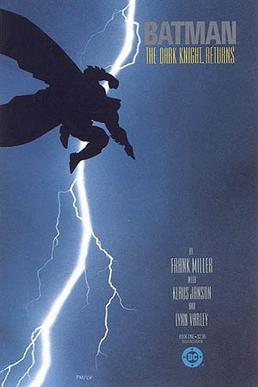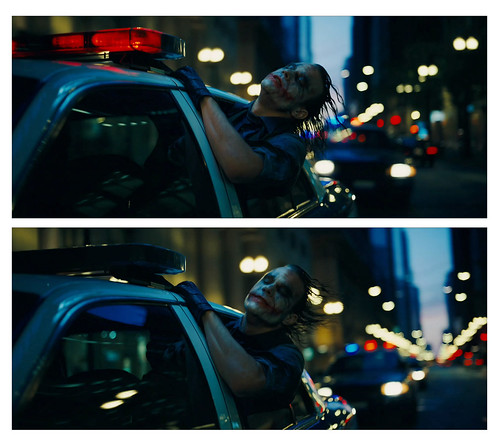 The question of “evil” and what exactly we as society and as individuals are supposed to do about it is one that has haunted everyday conversations for quite some time now. In a post-911 world, replete with hooded POWs having their heads hacked off and humiliated Abu Ghraib prisoners having their genitals shocked, the Jack Bauer–fueled belief that “the ends justify the means” has never been more hotly debated.
The question of “evil” and what exactly we as society and as individuals are supposed to do about it is one that has haunted everyday conversations for quite some time now. In a post-911 world, replete with hooded POWs having their heads hacked off and humiliated Abu Ghraib prisoners having their genitals shocked, the Jack Bauer–fueled belief that “the ends justify the means” has never been more hotly debated.
Or has it? In truth, it was a bit of a shock to read Batman Begins for the first time this past spring and realize it was first published in 1986. An atta-boy president who loves his ranch? Check. Escalating class tensions? Check. And above all else, a constantly prattling, fear-mongering media? Definitely a check there.
It’s easy to see why the Batman franchise of the ‘80s was practically screaming for yet another big screen adaptation some twenty years later.
And yet, at the risk of sounding like some stuffy censorship bureau critic, I can’t help but wonder at the message that’s being discussed through our society’s current fondness for all things Batman.
But wait! I just uttered the dreaded “m” word. As much as postmodernists may want to distance themselves from the loaded term, “discussion” simply doesn’t do justice to the vigilantism-loving scenarios that Miller puts forth in Batman. Sure, Bruce Wayne’s a flawed hero, and both Miller and Nolan show us that he has to pay a heavy price for his actions. Sure, each facet of the story is supposed to convey at least some spectrum of moral ambiguity (the conventionally horrific appearance of many of the graphic novel’s villains aside, that is).
 But at the end of the day, I can’t help but observe that the masses are titillated by the arc of blood streaming from the mutants’ bloody nose at the end of Book 1, fascinated by the gorgeous bokeh twinkling behind Ledger’s grease-painted face rapturously speeding down the city’s nighttime street…and rather powerfully seduced by the siren call of what Miller calls “the forceful, violent aspect of the will.”
But at the end of the day, I can’t help but observe that the masses are titillated by the arc of blood streaming from the mutants’ bloody nose at the end of Book 1, fascinated by the gorgeous bokeh twinkling behind Ledger’s grease-painted face rapturously speeding down the city’s nighttime street…and rather powerfully seduced by the siren call of what Miller calls “the forceful, violent aspect of the will.”
Does that bother you? It bothers me.
Of course, we’re meant to be disturbed, on one level or another. (Sorry Heath, it was just the “price” you had to pay for our collective admiration, apparently). But in all seriousness, is it enough to just acknowledge the demons inside of us and herald the occasional flawed, po-mo hero who “sublimates” said banshees? Despite agreeing with Miller’s assertion that “we’re at our best when we’re autonomous,” when I look at today’s world, I’m not sure I’m comfortable with how easily that can lead to the worst kinds of endsjustifymeans excesses. I’m not even convinced that the average movie-goer (or graphic novel reader, for that matter) even processes the “thickness” of that discussion.
Should they? At point do we move the locus of responsibility from the audience to the artist? To the medium? Should we ever?

Josh,
I think you underestimate the abilities of both movie-goers and graphic novel readers. I think it’s nearly impossible to miss the moral ambiguities of Batman and the endsjustifiesthemeans messages (even if they are at times mixed) in his story. In fact, in both the comics and the movies, we are constantly reminded of this struggle as people both condemn and praise the Batman. Some find him to be a menace who must adhere to the law. Others (like the police in the early scene who support his capture of the bank robbers) understand that while he operates outside the law, he maintains a moral code and helps the public good overall.
I believe the masses are not as drawn to the violence, or the joker’s insane smirk as much as they are to a well-written story. The Batman’s allure has always been that he’s just an average guy who happens to be rich. ANYONE can be the Batman with enough capital for research investment and training. At least, that’s how the theory goes. The same is true for his villains. Most lack any super powers but get by on cunning, and outright evil. Some of Batman’s villains (the Joker, Two-face, the penguin and the riddler especially come to mind for me) are so brilliant because they are such well-drawn, well-written representations of insanity, vengeance, and chaos.
I think these aspects create the allure for Batman. He’s not from Planet Krypton. He wasn’t bitten by a poisonous spider or given a green ring by some age-old being. He’s a guy who made himself who he is and who fights people who did so as well. In many ways, this makes him an embodiment of the American spirit, and by far the most accessible super hero. That and he’s so dark that it just becomes dreamy–all morbid and everything, even Morpheus (from the Sandman) must by amazed by Batman’s constant brooding.
Jared,
You bring up some great points–and I confess that part of the time I’m playing devil’s advocate in my post.
Yet there is still part of me that thinks that the takeaway from the book/movie (at least in part) is to acknowledge said moral ambiguities and then carry on with the violence per usual. I don’t know that mere acknowledgement equates a true discussion of “ends justify the means,” etc.
That said, I do think you make a great point re. a well-written story. I agree, just as I agreed with Miller’s point in the interview that “anytime a hero is done even reasonably well there’s a tremendous popular response…” And yeah, I’m quite familiar with the “average guy” argument…maybe I just wish Miller et. al. spent more time talking about why/how/what this “moral code” is. I don’t know, why didn’t Batman snap in the face of evil, like Twoface? (well, maybe he DID. but why did he snap in that direction?) Is good vs. evil just a question of chance?
As a sidenote, that’s fascinating how you’re tying in Batman’s allure with the traditional message of pull-yourself-up-by-the-bootstraps capitalism. Not only does he work hard, but as you aptly point out, he’s filthy rich–so he appeals to both our monetary wish fulfillment and to our desire for the heroic.
Anyway, I think part of the reason I’m inclined to be so hard on the Batman myth is simply because it’s so popular. I know, that’s really hipster of me…but I can’t help it! When so many people discuss the story and refer to it even in other conversations re. the ends justifying the means, etc, I am inclined to take a closer look.
Josh,
I think you underestimate the abilities of both movie-goers and graphic novel readers. I think it’s nearly impossible to miss the moral ambiguities of Batman and the endsjustifiesthemeans messages (even if they are at times mixed) in his story. In fact, in both the comics and the movies, we are constantly reminded of this struggle as people both condemn and praise the Batman. Some find him to be a menace who must adhere to the law. Others (like the police in the early scene who support his capture of the bank robbers) understand that while he operates outside the law, he maintains a moral code and helps the public good overall.
I believe the masses are not as drawn to the violence, or the joker’s insane smirk as much as they are to a well-written story. The Batman’s allure has always been that he’s just an average guy who happens to be rich. ANYONE can be the Batman with enough capital for research investment and training. At least, that’s how the theory goes. The same is true for his villains. Most lack any super powers but get by on cunning, and outright evil. Some of Batman’s villains (the Joker, Two-face, the penguin and the riddler especially come to mind for me) are so brilliant because they are such well-drawn, well-written representations of insanity, vengeance, and chaos.
I think these aspects create the allure for Batman. He’s not from Planet Krypton. He wasn’t bitten by a poisonous spider or given a green ring by some age-old being. He’s a guy who made himself who he is and who fights people who did so as well. In many ways, this makes him an embodiment of the American spirit, and by far the most accessible super hero. That and he’s so dark that it just becomes dreamy–all morbid and everything, even Morpheus (from the Sandman) must by amazed by Batman’s constant brooding.
Jared,
You bring up some great points–and I confess that part of the time I’m playing devil’s advocate in my post.
Yet there is still part of me that thinks that the takeaway from the book/movie (at least in part) is to acknowledge said moral ambiguities and then carry on with the violence per usual. I don’t know that mere acknowledgement equates a true discussion of “ends justify the means,” etc.
That said, I do think you make a great point re. a well-written story. I agree, just as I agreed with Miller’s point in the interview that “anytime a hero is done even reasonably well there’s a tremendous popular response…” And yeah, I’m quite familiar with the “average guy” argument…maybe I just wish Miller et. al. spent more time talking about why/how/what this “moral code” is. I don’t know, why didn’t Batman snap in the face of evil, like Twoface? (well, maybe he DID. but why did he snap in that direction?) Is good vs. evil just a question of chance?
As a sidenote, that’s fascinating how you’re tying in Batman’s allure with the traditional message of pull-yourself-up-by-the-bootstraps capitalism. Not only does he work hard, but as you aptly point out, he’s filthy rich–so he appeals to both our monetary wish fulfillment and to our desire for the heroic.
Anyway, I think part of the reason I’m inclined to be so hard on the Batman myth is simply because it’s so popular. I know, that’s really hipster of me…but I can’t help it! When so many people discuss the story and refer to it even in other conversations re. the ends justifying the means, etc, I am inclined to take a closer look.